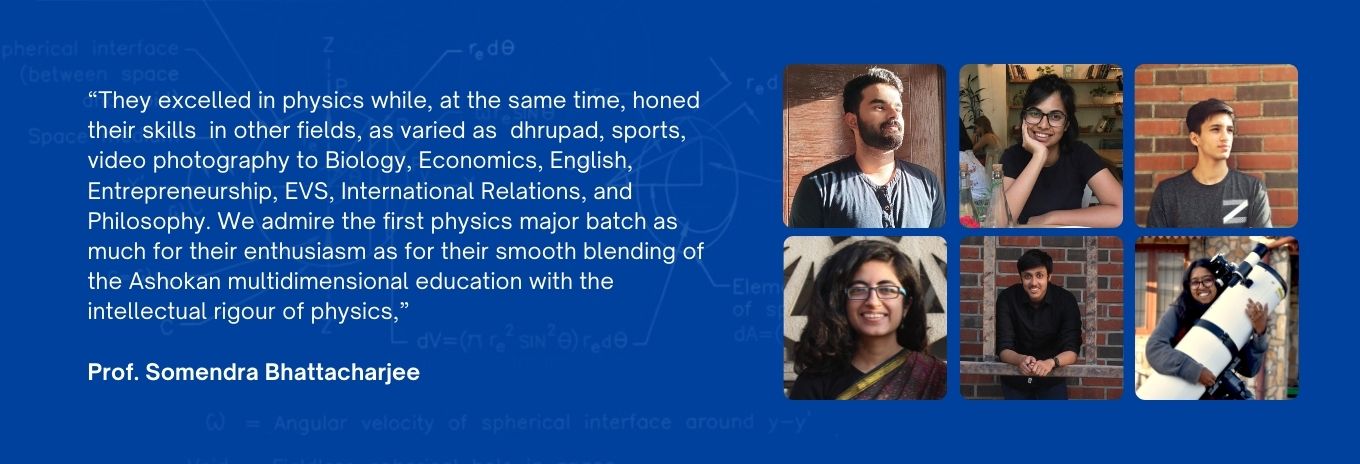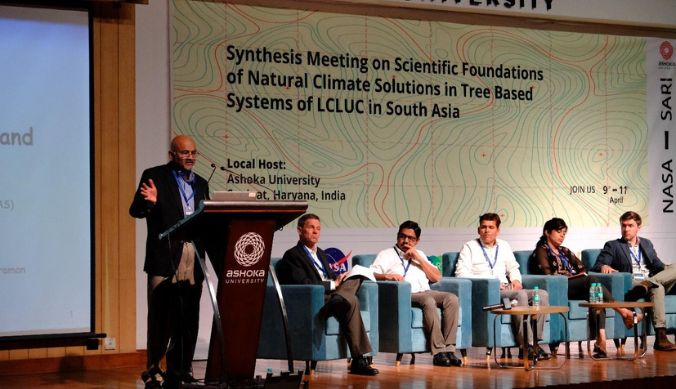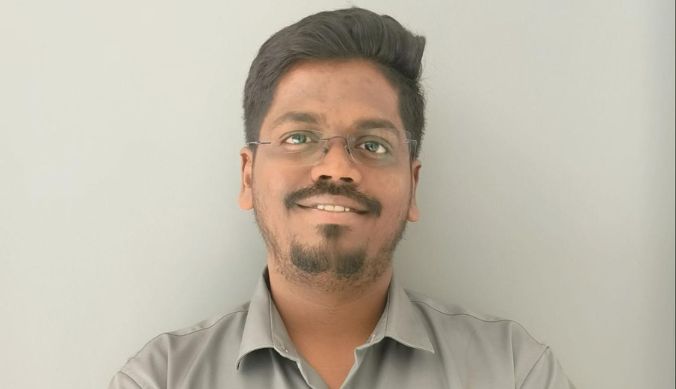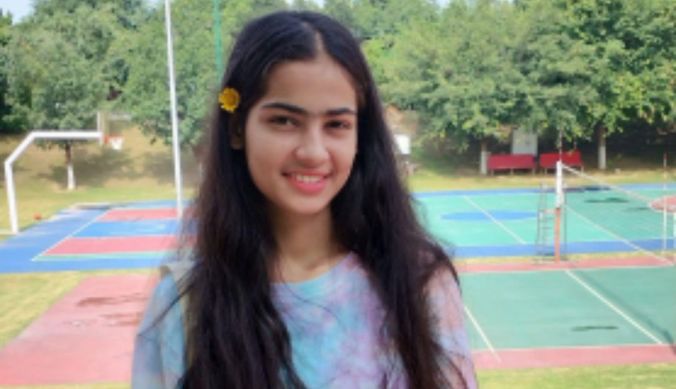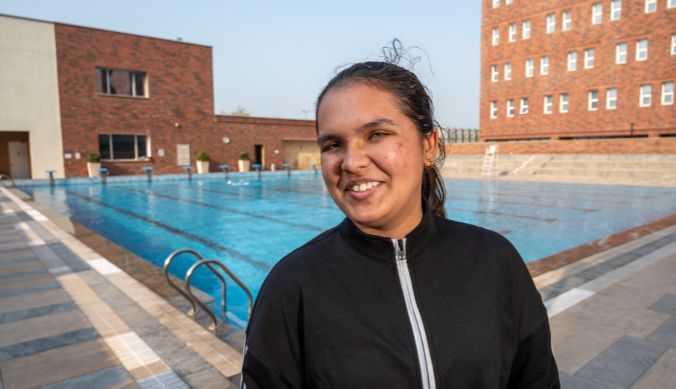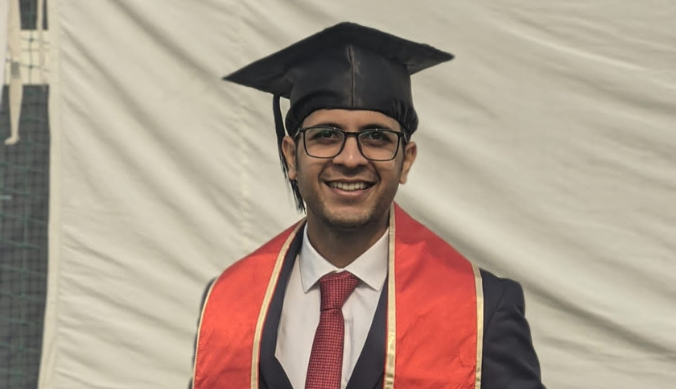Ashoka’s nonconventional interdisciplinary approach towards natural sciences: The success of the maiden Physics batch
The performance of the first Physics undergraduate batch upholds Ashoka’s interdisciplinary approach to teaching sciences.

Office of PR & Communications
6 August, 2021 | 4m readStudying sciences at a Liberal Arts research university like Ashoka is unique. Its research-based pedagogy taught by eminent global faculty, coupled with interdisciplinary approach to learning sciences, focus on critical thinking, state-of-the-art labs and infrastructure make Ashoka’s science programmes distinctive.
Perhaps the most exciting part of Ashoka’s pedagogy is the amalgamation of an interdisciplinary and multidisciplinary approach that makes up for a potent combination. And, putting them all together in a collective space and share ideas combining both education and research presents an unprecedented opportunity to do amazing science.
For the students who are pursuing sciences programmes at Ashoka, learning what research is and getting hands-on experience helps them to critically analyse what is happening around the world, and that is enthralling. Case in point – the first Physics batch and their incredible performance.
Physics is and can be many things to many people, and is the door that leads to the most incredible phenomenon in the universe. Albert Einstein once said, ‘The most incomprehensible thing about the universe is that it is comprehensible,’ and physics makes it all possible.
The first Physics batch which graduated this year is special. Out of the twelve students in the batch, six are going for their higher studies abroad with full scholarships. Professor Somendra M. Bhattacharjee, Head of the Physics Department, heaped praises on the batch.
“They excelled in physics while, at the same time, honed their skills in other fields, as varied as dhrupad, sports, video photography to Biology, Economics, English, Entrepreneurship, EVS, International Relations, and Philosophy. We admire the first physics major batch as much for their enthusiasm as for their smooth blending of the Ashokan multidimensional education with the intellectual rigour of physics,” Bhattacharjee was quoted saying.
The Physics Department was set up four years ago. One of the main people behind its establishment, Bikram Phookun, currently the Assistant Professor of Physics at St. Stephen’s College, University of Delhi talked about this in detail. “In setting up the Physics programme at Ashoka we had to fit a rather large number of ‘absolutely necessary’ courses and labs into the constraints of the Ashoka system, which requires students to do a lot of courses outside their major. I think we were able to use the constraints creatively to design a programme whose core courses cover all the basics of physics and whose electives offer students the possibility of deepening or broadening their knowledge of physics. The Physics programme also contains many courses of interest to those wishing only to do a minor or a concentration in physics (or even just to dabble in it!),” said Phookun. He was the Professor of Physics at Ashoka between 2017 and 2019.
Apart from Phookun and Sabyasachi Bhattacharya, former CV Raman University Professor at Ashoka and current Director, TCG-CREST, Amin Nizami and Pramoda Kumar, who joined the department as assistant professors, helped in designing the courses and implementing the experiments. In addition, there are a few names whose undeniable contributions helped the process of setting up easier − Lab Superintendent Sudarshana Baneree, Lab Assistant Pradip Chaudhuri and the Teaching Fellows (TF) including Philip Cherian, Ojasvi Khare, Shreya Arya, Manpreet Kaur, Malavika Srivastava, and Aditya Jain. Chaudhuri’s skill in the lab is exceptional, and he helped to make it a place where students wanted to be wherein the TFs helped in setting up the labs, doing a lot of the initial work of procurement of equipment, exploring options for experiments, and also helped develop the theoretical courses, among others. The department gained immensely from the contributions of all them. Every one of them was a friend, philosopher, and a guide to the entire batch.
We got in touch with some of the students who received full scholarships for their higher studies abroad and asked them to share their experience of pursuing Physics at Ashoka.
“The liberal arts curriculum helped me critically analyse my ideas and beliefs. My learning was not limited to a science textbook, instead in all Physics and Biology courses students were motivated to understand the history behind any scientific development. This approached encouraged me to understand that science does not exist in a vacuum. Religion as well as political ideas can direct scientific analysis in particular directions. One needs to understand these ideas to get a holistic view of scientific discoveries,” said Yajushi Khurana who is going to pursue a Ph.D. in Computational Biology at the joint University of Pittsburgh-Carnegie Mellon programme.
Rahul Menon jumped in, “I was a little skeptical when joining Ashoka, we were the first batch of Physics students which meant we did not have any seniors to look to for advice nor any alumni to turn to, to see what this programme would offer. I am happy to say that it was one of the best decisions I ever made. I have always had a knack for visualising physical systems, allowing me to grasp new concepts very quickly and over the last three years I have been given an environment where I could refine this skill.”
For Menon, the lab courses were one of the highlights of the course. He continued, “At Ashoka, instead of being confined to a formulaic procedure, we were confronted with problems and given the necessary apparatus to discover a solution ourselves, often prompting me to come up with innovative albeit sometimes unorthodox setups for collecting and analysing data.
“The Professors and TFs were incredibly supportive in and out of the classroom. They were invested in seeing that we were developing a deep understanding of whatever we were studying and gave us a lot of opportunities to test and apply these skills. We were introduced to ongoing research through weekly colloquiums that allowed us to expand our view of what we could pursue after graduating and how the concepts we were learning would translate to real-world research.” Menon is going to pursue an MA in Physics with specialisation in Quantum Technology at the University of Waterloo.
For Shwetabh Singh, however, the answer was fairly simple. “Ashoka is possibly one of the best places I could have pursued natural science in the country.” Singh is going to pursue an MA in Aerospace Engineering at Virginia Tech.
For Rashmi Gottumukkala, one of the main factors for the Physics programme’s uniqueness is the excellent laboratories. She said, “We were able to do sophisticated experiments like the Michelson Interferometer and the Zeeman Effect using top-class equipment. Our TFs also encouraged us to develop programming skills using Python in the lab, which later on became indispensable during projects and research work. At Ashoka, instead of looking at the labs as a chore (which is common for science students to do), we thoroughly enjoyed them, and for me, they were usually the highlights of the day!
“Ashoka has encouraged student endeavours, giving us funds to purchase a telescope for amateur astronomy, a diffraction grating for stellar spectroscopy, and a solar astronomy kit, amongst other things. Through these activities at the Astro Club, I was able to discover my love for amateur astronomy, which pushed me to seek an astronomy research project in my third year. This finally led me to realise that astronomy and astrophysics were fields I would like to pursue, the hope being to eventually become an astronomer.” Gottumukkala has received an Inlaks Scholarship to pursue an MA in Astrophysics at the University of Geneva.
Sreya Dey summed it up perfectly. “Had I not come to Ashoka, I would not be who I am today. The kinds of conversations and topics I engaged with at Ashoka made me confront some of the most difficult questions that I have had about myself. I faced several challenges, both personal and academic. Even though I constantly struggled, in hindsight, I know that it helped me understand myself. Physics was a difficult subject. Going into the programme, I knew that I loved it. And now, I still love it, but it is a different kind of love. I have learnt to appreciate the difficult parts and realised that to become good at it or do something substantial in it, one needs to make a dedicated effort for a long time. This realisation coupled with the realisation that I wanted to put in that effort which led me to choose a Master’s in Physics. My professors and peers helped me throughout, and none of it could have been possible without their support. Plus, I had a lot of fun!” Dey has an acceptance from the University of Jena, Germany for an MA in Physics but is exploring other options as well.
Their batchmate Heer Shah is going to pursue an Elite Masters in Advanced Materials and Processes at the Friedrich-Alexander-Universität Erlangen-Nürnberg, Germany.
The Physics programme at Ashoka was enriched by the presence of many extraordinary minds like them and was designed in such a manner that other students pursuing it as a minor could also benefit from it, thereby upholding Ashoka’s interdisciplinary pedagogy.
A prime example of this is Kabir Bakshi. The Physics Department has contributed significantly to his success. And guess what did Kabir major in? Philosophy. Yes, you read that right! Kabir majored in Philosophy but took almost all the Physics Theory courses that the subject majors did, and not just that, he was at or near the top of the class in all of them. Last year he received the Felix Scholarship to get into the extremely prestigious BPhil programme in Philosophy at Oxford University, with the declared intention of specialising in the philosophy of science.
Phookun said, “I have no doubt that the training in physics he received from the department, and the strong recommendation I wrote in support of his applications, contributed to his being admitted to Oxford (and, I hope, his continued success there).”
Vidur Singh, a Computer Science major is another example who took no theory courses in physics but was the top student in all the lab courses. Presently, he is pursuing his Master’s degree in artificial intelligence from Aarhus University, Denmark.
Ashoka congratulates everyone involved in making the Physics programme a stellar success! We are sure that these graduates with their knowledge, skillset, problem-solving skills and critical thinking with a passion to make a difference will go onto do many great things in the world.





